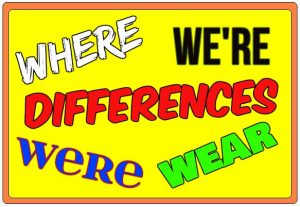Differences Between Where vs. Were, Wear And We’re

When it comes to tricky words, or words that sound and are spelled alike, it can sometimes be hard choosing between them. Where vs. were, wear and we’re are a prime examples. These batch of words are called homophones (words that sound or are spelled the same) but have different meanings. In most cases, these homophones are only two or three words. However, there are some exceptions with many out there containing more than 2, such as these 4. Trying to choose out of these 4 words can be a problem for many people, not just writers. This is because they are pronounced and almost spelled the same. Where, were, wear and we’re, are a the top of the list of confusing homophones. So how can you tell the differences between where vs. were, wear and we’re? Luckily, there are certain tips and tricks you can use to help make that decision easier.
A Problematic Group Of Words
If there is a group of words that can be really problematic for students and writers, it is the were, wear, we’re and where group. The reason for this is because this group of homophones contains more than just 2 words. Although wear and we’re can also cause some problems for people, they are not as problematic as where and were though. Those two are often confused and used incorrectly by some people. Still, let us examine the best ways to be able to tell them all apart.
Make sure you also check out Who or Whom Grammar Rules
Similar Words, Different Classes
Although were and where both sound and are almost identical in spelling, they belong to two different classes.
Were – This word is what is called a plural past verb form. That is because it is a past form of the word ‘are’. The difference being that were refers to more than one person. Were is used when referring to something that already happened or in the past. In addition, were is a state of being verb.
Examples –
Were you listening to the news last night?
Both of my best friends were out of town yesterday.
Can you tell me if you were sleeping when I called?
As you can see from these examples, in every instance, were is used in the past tense. If you were to insert ‘where’ instead, the sentence would not make sense.
Where – Out of all these words, it is the most versatile and easiest to decipher. That is because where refers to a location, place or situation. This makes where and adverb pertaining to time. In addition, it also makes it a question word used to ask for a location, place of someone or something. Many people remember where as one of the five ‘W’ questions words. The other four are ‘Why,’ ‘What,’ ‘When,’ and ‘Who.’ Another way that where differs from were, wear and we’re, is due to the pronunciation.
Examples –
Can you please tell Michael where I live?
Don’t forget to tell mom where you are going later.
Where in New York do you work again?
Keep in mind though, that in some instances, where can be used to mean ‘in which’ as well.
Examples –
No one knows an example where you can use those colors together?
No one knows an example in which you can use those colors together?
While you can use where in place of which, you should use ‘in which’ in most cases. Especially if the latter word combination makes more sense or better explains your sentence.
As we’ve shown in the previous examples of where, the same applies here with these examples. If you try and insert ‘were’ in place of ‘where,’ you would see that sentences would not make any sense.
Wear – This is primarily a verb referring to clothing or to carry, protection or adornment. It becomes a noun when you use it plural or in past tense.
Examples –
I love it when you wear those jeans.
Nobody should wear a turtleneck during the summer.
That couch has a lot of wear and tear.
We’re – may be the second of the easiest of all these homophones to remember using out of all the other 3. That is because we’re is simply an extension of we are. We’re is also a contraction of the phrase ‘we are’. The difference being the apostrophe taking the place of the letter ‘a’ in the word.
Examples –
We’re all going to the game yesterday, but the car broke down.
The next time she comes over, we’re going to tell her the truth.
No, we’re not leaving till it is finished.
You may also want to read about Six Important Grammar Rules You Need To Know
Below, is a sentence which uses all 4 homophones together correctly.
Where were you when Angela says she wears everything we’re washing?
The simplest way to make sure you use the correct one out of all of these similar sounding and spelled words is by replacement. Simply replace the word you are using with another in the sentence to see which one actually makes more sense. This way, you can see which one out of all them, fits correctly.
